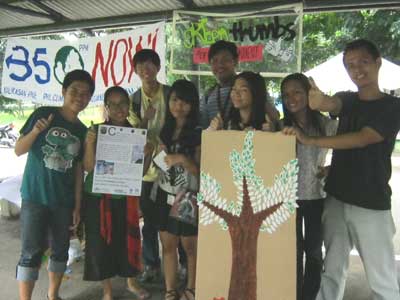
(350 kids in the Hindu Kush)
h-Energy week is over. Was it a success? Well large parts were; many of the events were very well attended, including most of the “small” rural ones and the very successful Transition Towns meeting with Rob Hopkins speaking plus literally dozens of others making 45 second presentations, ably organised by Rob Garner and Nick Sherwood. Saturdays technology showcase in the Shirehall had lots of exhibitors of solar panels and a few other bits of hardware, but was poorly attended and the talks section wasn’t organised at all and was cancelled at the last minute; the first time that’s happened at an event where I’ve been due to speak. Bit of a disappointment. But overall the week was a success, and well organised by Kate and Ali.
All the events of h-Energy week in Herefordshire were registered as just one of the 7347 events in 188 countries that made up the extraordinary 10/10/10 Global Work Party organised by 350.org The global reach of this has been amazing; actions in all but four countries in the world, and reaching into every corner of every continent. Avaaz.org is another of this new wave of global green campaigning organisations who are achieving remarkable results, and with membership growing at 100,000 per month they’re getting a lot done. See http://www.avaaz.org/en/global_victory_report/?cl=785972663&v=7362
The task confronting humanity to reduce atmospheric Co2 to 350 ppm is daunting, but with the growing global campaign and the strengthening technological possibilities of moving to 100% renewable energy it is, I feel, increasingly encouraging. Political will has been lacking, but I see increasing signs that this is changing. Herefordshire Council commissioned Wardle Armstrong to write a report on the possibilities for local generation within Herefordshire and Alex Salmond recently forecast Scotland will be generating 100% renewable electricity by 2025. Things are changing! http://newsnetscotland.com/general/702-renewables-can-supply-all-of-scotlands-electricity-by-2025
Monthly Archives: October 2010
Gussing Renewable Energy

(Gussing biomass gasification)
The small Austrian town of Gussing is an inspirational example of radical reduction in carbon emissions and new ecologically based sustainable prosperity. They have achieved an incredible 93% reduction in Co2 emissions while creating 1,000 new jobs in a small town of only 4,000 people. The whole region of South Burgenland is now independent of the global fossil fuel based economy; they generate all their own renewable electricity, heat and transport fuels. At the heart of this is a cutting edge wood gasification plant that produces liquid fuels, heat for the town heat main and electricity. The region now has dozens of other renewable energy plants and has attracted new green businesses who want the stable future energy costs associated with sustainable local renewable energy systems and the ethical kudos of their businesses being part of the new low carbon economy. More info on what they’ve done in Gussing can be found here http://en.wikipedia.org/wiki/G%C3%BCssing and http://guessingrenewableenergy.com/
Much of what has been achieved in Gussing could be done in Herefordshire, where I live. Saturday 16th October, 2.00pm at the Shirehall, I’ll be speaking about what Herefordshire could learn from places like Gussing. Please come along! There are so many positive opportunities. This talk is part of h-Energy week. See (although my talk isn’t mentioned on this link) http://www.herefordshirenewleaf.org.uk/h-energy?page=1
Also this week I’d like to flag-up an excellent competition run by Forum for the Future called “Gatecrashing the Energy Sector”. I’ve put in an entry called “Dissemination Global Best Practice”. Getting more people to vote and submit ideas will help the process, and if anyone wants to vote for my idea that would be terribly useful to promote many of the kind of ideas I write about in this blog. Go to http://gatecrashenergy.ideascale.com/a/dtd/82396-10389
Local Action

(gREen thumbs group in the Philippines, one of the amazing 4376 grassroots groups in 173 countries signed-up to 10/10/10)
h.Energy week will run from 10th to 16th October. It aims to raise awareness of carbon reduction and renewable energy activities in Herefordshire. It is being organised by Herefordshire newleaf http://www.herefordshirenewleaf.org.uk/ During the week there will be dozens of open houses demonstrating renewable energy technologies and sustainable building techniques, an energy showcase at the Shirehall with speakers (me included) and exhibitors, but perhaps most exciting of all the presentation by the consultants Wardle Armstrong of their study on the possibilities of renewable energy in Herefordshire.
All the h-Energy events count as just one of the 4,376 events organised in 173 countries as part of the Global Work Party organised by 350.org for 10th October 2010: 10/10/10 (see http://www.350.org/ ) More events are being organised daily. This, like the 24th Oct action last year, establishes 350.org ‘s climate change campaigning as the biggest global political/environmental action in history. All this is excellent, necessary, and has my full support. However these actions and the actions of individuals in relation to their own houses and lifestyles have limited power to actually reduce Co2 total emissions. We need the bigger changes that can only be made by councils, governments and international agreements. Copenhagen was a failure and so far both the UK government and Herefordshire Council’s policies have been far from inspiring.
It has been my mission over the last few years to write and speak about the most inspiring examples that I can find. Very often these inspiring examples are led by visionary councils and mayors who seek dramatically more ecologically sustainable developments which also lead to greater economic prosperity. The Danish island of Samso, the Chinese city of Baoding and the Austrian town on Gussing are three wonderful examples. Perhaps the Wardle Armstrong report will make the right kind of recommendations and inspire Herefordshire Council to rewrite its local development framework document and set our county on a low carbon sustainable development path as inspiring as the Austrian town of Gussing, about which I’ll write next week, and which has reduced Co2 emissions by an amazing 93%!
